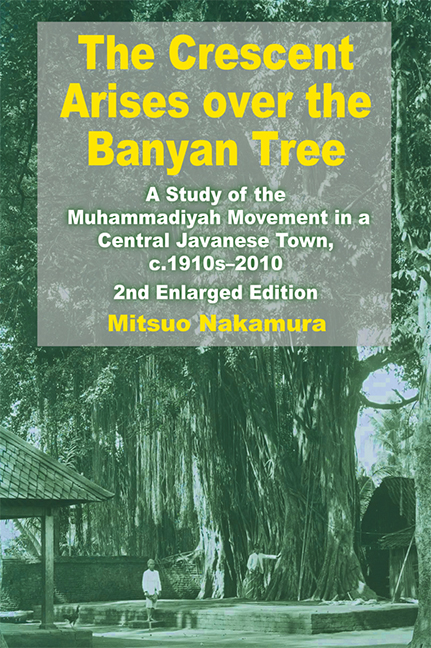 The Crescent Arises over the Banyan Tree
The Crescent Arises over the Banyan Tree Book contents
- Frontmatter
- Dedication
- Epigraph
- Contents
- List of Figures and Maps
- List of Tables
- List of Boxes
- Foreword to the Second Edition
- Preface to the Second Edition
- Foreword to the First Edition
- Preface to the First Edition
- Notes
- Map
- PART I DEVELOPMENT OF THE MUHAMMADIYAH IN KOTAGEDE, c.1910s–1972
- PART II KOTAGEDE REVISITED, 1972–2010
- Epigraph
- Map
- Introduction to Part II
- 8 Social Changes in Kotagede, 1972–2010
- 9 The Achievements of the Muhammadiyah
- 10 Internal Dynamics of the Muhammadiyah Movement
- 11 Challenges Facing the Muhammadiyah
- 12 Festival Kotagede: Conflict and Integration
- 13 The May 2006 Earthquake and Reconstruction of Kotagede
- 14 Concluding Remarks: Future of the Muhammadiyah
- Postscript to Part II
- Bibliography
- Glossary
- Appendices
- Index
- About the Author
14 - Concluding Remarks: Future of the Muhammadiyah
from PART II - KOTAGEDE REVISITED, 1972–2010
Published online by Cambridge University Press: 21 October 2015
- Frontmatter
- Dedication
- Epigraph
- Contents
- List of Figures and Maps
- List of Tables
- List of Boxes
- Foreword to the Second Edition
- Preface to the Second Edition
- Foreword to the First Edition
- Preface to the First Edition
- Notes
- Map
- PART I DEVELOPMENT OF THE MUHAMMADIYAH IN KOTAGEDE, c.1910s–1972
- PART II KOTAGEDE REVISITED, 1972–2010
- Epigraph
- Map
- Introduction to Part II
- 8 Social Changes in Kotagede, 1972–2010
- 9 The Achievements of the Muhammadiyah
- 10 Internal Dynamics of the Muhammadiyah Movement
- 11 Challenges Facing the Muhammadiyah
- 12 Festival Kotagede: Conflict and Integration
- 13 The May 2006 Earthquake and Reconstruction of Kotagede
- 14 Concluding Remarks: Future of the Muhammadiyah
- Postscript to Part II
- Bibliography
- Glossary
- Appendices
- Index
- About the Author
Summary
As concluding remarks for my observations on the history of the Muhammadiyah in Kotagede from 1972 to 2010, I shall present a review of a number of aspects concerning the achievements of the movement during the period and challenges it currently faces. On the basis of those reviews, I shall discuss the future of the movement.
BACKGROUND FOR THE SUCCESS OF THE MUHAMMADIYAH
The success of the Muhammadiyah in propagation and institution-building occurred mostly during the 1970s and 1980s. One of the objective conditions for this was the drastic change in national political situation after the G30S/PKI Affairs. The military led by General Soeharto took a firm anti-PKI stance, and engaged in violent suppression and persecution of PKI members and supporters. They were removed from the public stage forcibly. In Kotagede, the Muhammadiyah activists took initiatives to arrest and hand them over to the military.
In the aftermath of the G30S/PKI Affairs, the Communists were not only banished as political rebels but also designated as atheists who were antagonistic to Pancasila, the founding philosophy of the nation. Then, religions — the officially recognized ones — were utilized as a means to subjugate and brainwash ex-PKI members and supporters ideologically. For those people, the declaration of affiliation with one of those religions and the participation in religious activities provided a way of survival. In many areas outside Kotagede, this practice seemed to have benefitted Protestant and Catholic churches, which welcomed new converts from the ex-PKI members and supporters. In Kotagede where the number of Christians was negligible, it brought a favourable result for the Muhammadiyah. The local Muhammadiyah branch was actively engaged in propagating for ex-PKI members and sympathizers in cooperation with the government authorities, and thus expanded its influence in the ex-PKI neighbourhoods. In this way, the Muhammadiyah “won” the decades-long confrontation with the PKI and benefitted from the victory. In other words, the Muhammadiyah overwhelmed the PKI after the G30S Affairs not so much through ideological debates but through the coercive situation where few other choices were allowed for the ex-PKI people than to submit to the life-ordeath pressure.
- Type
- Chapter
- Information
- The Crescent Arises over the Banyan TreeA Study of the Muhammadiyah Movement in a Central Javanese Town, c.1910s-2010 (Second Enlarged Edition), pp. 361 - 371Publisher: ISEAS–Yusof Ishak InstitutePrint publication year: 2012


